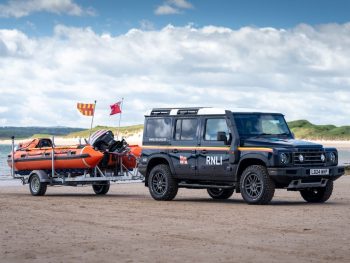The Royal National Lifeboat Institution (RNLI) has signed a partnership deal with Ineos Automotive.

Over the next five years, the Ineos Grenadier will become the official vehicle of RNLI lifeboats and support the charity by helping its volunteer lifesavers launch to those who are in difficulty in the water and in need of their help.
A total of 20 Grenadier station wagons will be deployed at certain locations around the UK and Ireland to support the charity’s volunteers in their lifesaving role.
As well as undertaking regular duties at lifeboat stations, the Grenadier’s main role will be to position, launch and recover the RNLI’s D-class lifeboat at selected stations. The inflatable D-Class has been the charity’s workhorse for the past 60 years, saving over 30,000 lives and aiding more than 160,000 people.
The RNLI conducted intensive coastal trials of the Grenadier which demonstrated its off- and on-road driving performance, along with robustness and durability to safely withstand the rigours of RNLI activities.
Jamie Chestnutt, RNLI director for engineering and supply, said: “The partnership between the RNLI and Ineos Automotive aligns perfectly with Ineos’s ‘Built for More’ ethos, given the lifesaving work conducted by the RNLI and our volunteers. As a charity which relies solely on donations, support such as this from Ineos Automative enables the RNLI to continue to save lives at sea, while also providing our operational volunteers with the best equipment available. Only by working in true partnership with industry can we sustain our lifesaving service in our 200th year and beyond.”
As well as providing the RNLI with its Grenadier, the partnership will see Ineos support the charity to spread its vital water safety messages to new audiences.
Lynn Calder, CEO, Ineos Automotive, commented: “We’re very proud to support the RNLI, an incredible charity that performs round-the-clock life-saving work in very difficult conditions. Its volunteers rely on vehicles every day, both boats and cars, so this is a powerful endorsement of the Grenadier that it’s able to meet the rigorous standards required for such vital frontline work.”

